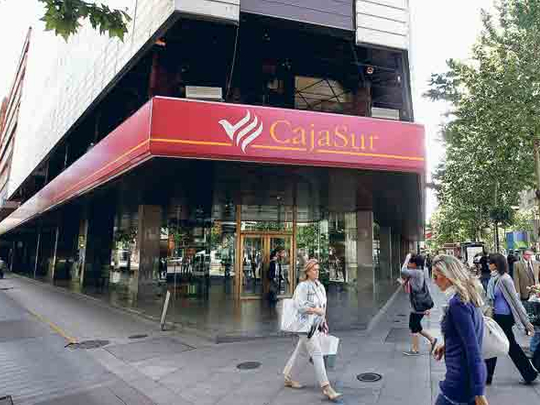
London: European Union stress tests found banks need to raise 3.5 billion euros (Dh16.5 billion) of capital, about a tenth of the lowest analyst estimate, leaving doubts about whether regulators were tough enough.
"The stress tests are a helpful step forward in a number of areas," Huw van Steenis, head of European banks research at Morgan Stanley in London, said on a conference call on Sunday.
"But they are not going to be the game changer that we were really hoping and in some cases are a missed opportunity."
European banking shares rose after the tests found that only Germany's Hypo Real Estate Holding AG, Agricultural Bank of Greece SA and five Spanish savings banks lacked adequate reserves to maintain a Tier 1 capital ratio of at least six per cent in the event of a recession and sovereign-debt crisis, according to results published on July 23. The banks that failed the stress tests are in "close contact" with national authorities over how they will raise capital, said the Committee of European Banking Supervisors, which ran the assessments of 91 lenders.
"The worst fears have not been realised," said Mike Lenhoff, chief strategist at London-based Brewin Dolphin Securities, which oversees $33 billion (Dh121 billion).
Nobody would say we are looking at a complete and utter disaster here in the euro-zone banking system."
Ignored
Allied Irish Banks, Dexia and Societe Generale led European bank stocks higher. The 54-company Bloomberg Europe Banks and Financial Services Index rose 1.1 per cent.
Had the Tier 1 threshold been seven per cent, 24 of the banks would have failed, said Andrew Sheets, Morgan Stanley's head of European credit strategy in London, on the call. For some, there is "serious work to do," he said.
Before the results were published, analysts at Nomura Holdings estimated the banks would have to raise 30 billion euros. Goldman Sachs Group predicted they would need 38 billion euros and Barclays Capital said they would require as much as 85 billion euros. Tests carried out in the US last year found that 10 lenders, including Bank of America and Citigroup, needed $74.6 billion.
"If we had at least one bank which the markets hadn't really expected to fail, that would have given the stress tests more credibility," Lothar Mentel, chief investment officer at Octopus Investments in London, whose team manages more than £600 million (Dh3.4 billion). "That hasn't happened."
The European tests ignored the majority of banks' holdings of sovereign debt. Regulators don't believe there will be a national default, European Central Bank Vice-President Vitor Constancio said on July 23. The evaluations took into account potential losses only on government bonds the banks trade, rather than those they are holding until maturity, CEBS said.
"The fact that they did not stress the bank book is going to be seen as a weakness," said Robert Talbut, chief investment officer at Royal London Asset Management, which oversees about $52 billion.
"I don't think the results of the tests will resolve anything."
Lenders hold about 90 per cent of their Greek government bonds in their banking book and 10 per cent in their trading book, according to a survey by Morgan Stanley. They have to write down the value of bonds in their banking book only if there is serious doubt about a state's ability to repay in full or make interest payments.
The stress tests assumed a loss of 23.1 per cent on Greek debt, 14 per cent on Portuguese bonds, 12.3 per cent on Spanish debt, and 4.7 per cent on German state debt, according to the CEBS. UK government bonds were subject to a 10 per cent haircut and France 5.9 per cent, CEBS said.
The stress tests are rigorous enough to be taken seriously, Credit Suisse Group AG analysts led by Daniel Davies said in a report after the results were published. Banks passed because the European industry has raised 220 billion euros in the last 18 months to bolster capital, they said.
The Credit Suisse analysts found that the majority of banks still passed the tests when they were reengineered to include bigger haircuts on sovereign debt and better quality capital. Under those more rigorous tests, seven Greek banks and KBC Groep NV would fail.
"The criteria used by CEBS created a level playing field for all 91 banks," Viviane Huybrecht, a spokeswoman for KBC in Brussels, said by phone. "If you now come up with other criteria then of course you end up with other results."
Calls to Alpha Bank, National Bank of Greece, Hellenic Postbank, EFG Eurobank Ergasias, Bank of Cyprus and Piraeus Bank out of office hours were not immediately returned.
European governments aimed to use their first coordinated stress tests to reassure investors about the health of financial institutions after the debt crisis pummelled the bonds of Greece, Spain and Portugal. Mounting budget deficits in those countries raised concern that they won't be able to pay their debts.
"The results give you the go-ahead that it's safe to invest in banks," said David Serra, co-founder of Algebris Investments, a fund manager which has shares in Societe Generale and Banco Santander.
"We have just had one of the biggest crises and the message from these tests is that the banking system can withstand a double dip."












